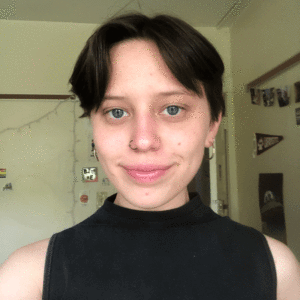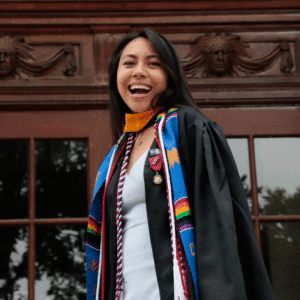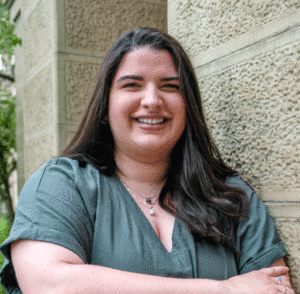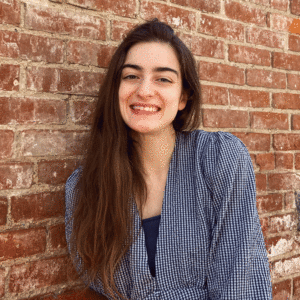Pride and the progress still needed
By Swati Pandey ’23
Ella Goodwin ’21, Kimberly Mae Manalang ’21, Kelsey Moum ’21, and Victoria Puglia ’21 not only invested in their academic and professional futures during their years at Lafayette, but they also worked tirelessly to educate their community on social justice issues. Below, each responds to this question: “What is the one involvement/engagement/activism that you are most proud of, and what more can be done so that Lafayette can be the inclusive space that you have envisioned?”
 Ella Goodwin ’21
Ella Goodwin ’21
Majors: Women’s, gender, and sexuality studies and anthropology & sociology
I joined Pards Against Sexual Assault as a first-year when the group was still in its infancy. Since then, I’ve worked alongside many other powerful student leaders to solidify this group on campus and push our community to be more conscious of how we can better prevent sexual violence and support survivors. As I leave Lafayette, I feel proud to see that there are so many passionate students continuing the organization, and there are changes happening institutionally, including a new research-based First-Year Orientation prevention program and the hiring of a student advocacy and prevention coordinator. Our campus has come a long way in terms of even just acknowledging that sexual violence occurs in our community considering that over 200 people attended one of our community discussions last semester.
However, there is still so much work to be done, and I hope that students do not lose steam in the push to end sexual violence, racism, sexism, homophobia, transphobia, and ableism on our campus. These issues all interact and support each other, and we need to work harder to really care for and look out for every member of our community. We have to be pushing the institution to do better, but we also need to examine our own actions, the actions of our friends, and the organizations we are a part of. You have the power to intervene and shut down harmful behaviors, and you have the responsibility to educate yourself on how to best do that, particularly if you hold a certain level of privilege and social capital on this campus.
 Kimberly Mae Manalang ’21
Kimberly Mae Manalang ’21
Major: Biology
I have two activism projects that I was very proud to not only be a part of but to lead: “Having the conversation on ICE/Continuing the conversation on ICE” and the month-long events for Asian American Pacific Islander (AAPI) Awareness Month: Fighting for Visibility. There is a lot that still needs to be done for Lafayette to become a more inclusive space. My senior year was a year for many firsts—the first Migration Week addressing politically charged topics like U.S. Immigration and Customs Enforcement, and the first AAPI Awareness Month to start the conversation on the discrimination the Asian/AAPI community has been facing for decades. In the next few years, I would hope awareness months become normalized to annual events. Instead of an AAPI Awareness Month, striving to celebrate AAPI Heritage Month in May would be the next goal. While I am graduating, I still hope the next Lafayette leaders continue the conversations that we, the seniors, have helped start and normalize having harder conversations on topics like this.
 Kelsey Moum ’21
Kelsey Moum ’21
Majors: Government & law and women’s, gender, and sexuality studies
I see myself as being extremely lucky to have been involved in spaces on campus that uplift students’ personal narratives and histories. I think in relevance to this question, Kaleidoscope holds a very interesting position on campus. We are a group that is very involved with first-year students, introducing new students at Lafayette to all of the different social justice spaces on campus. We are also called upon by many different student and faculty groups to educate and facilitate discussion surrounding identity, which we see as just the first step to any organization’s pursuit of creating an inclusive space. The prevalence of activism on campus in the past year has also really shown us our limitations. As a group of student volunteers, we found ourselves stretched thin. Kaleidoscope peer educators are not experts on the topics we create spaces for discussion around, but rather we are on our own educational journey along with our peers. Kaleidoscope at the moment is often used by student organizations to check off the box of DEI initiatives and may be the first and last conversation certain groups have about identity. I think pushing back against this narrative and putting pressure on the spaces of campus that distance themselves from social justice issues is a starting point to creating a more inclusive social landscape at Lafayette.
 Victoria Puglia ’21
Victoria Puglia ’21
Major: International affairs
I am most proud of my involvement with the International Students Association and seeing its growth over the past few years. While the school is taking steps in a better direction, for Lafayette to become more inclusive in a way that fosters greater feelings of belonging for all students regardless of background, there is still a lot of work left. This requires an honest attempt to understand the unique needs, challenges, and struggles facing different groups through actual conversation and dialogue. It is crucial that we put in genuine effort to understand how something is affecting other groups. More dialogue would indicate that these students and organizations are heard, supported, valued, and appreciated. The past year, especially with COVID-19, was the first time I began to see some positive changes in this regard. And as I began to see these changes, I also began to see changes on the ground.
This brings me to the next point: action. From dialogue grounded in lived realities, planning and organization can ensue. However, when we make blind changes without considering how they actually affect the students they are trying to empower, that change tends to be misguided or fall short. I would like to see greater linkages between dialogue and action to ensure that we are consistently moving towards a better future that is built on shared goals and experienced realities. For instance, creating official and unofficial spaces for minority groups. ISA has over 200 members and no official place to get together to work or hang out. We host many events for our members as well as for the community but are always floating through different parts of campus. This can sometimes make it harder to engage in deeper and more profound conversations at a formal level about the international student experience.
I would also like to see a shift in the conversation concerning “diversity and inclusion.” While yes, that is important, diversity and inclusivity mean nothing without empathy, mutual respect, curiosity, and patience.